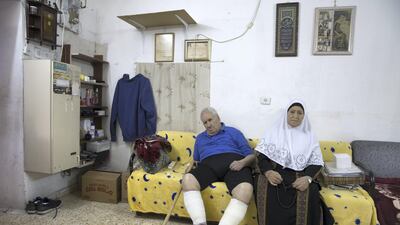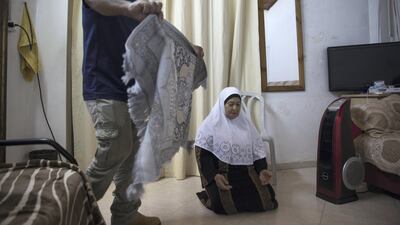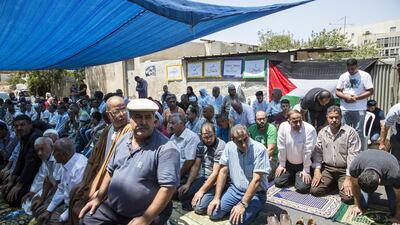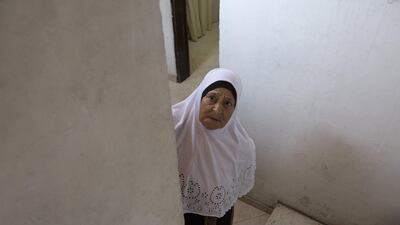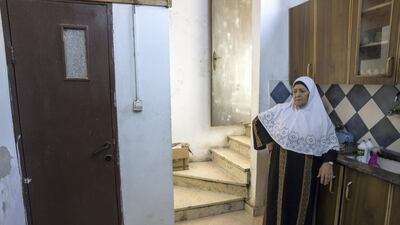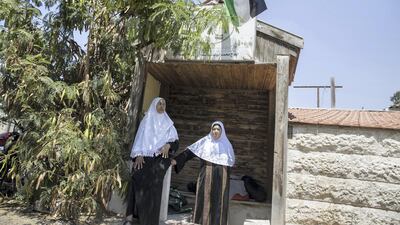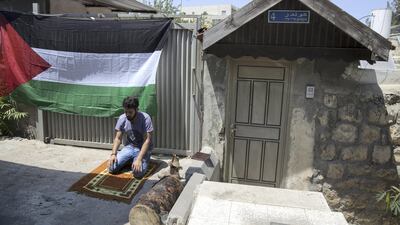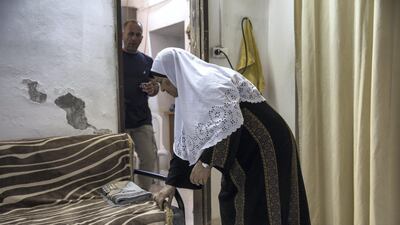It was time for evening prayers in East Jerusalem's Sheikh Jarrah neighbourhood and Mohammed Shamasneh led relatives and neighbours through the prostrations, his forehead touching a carpet he had unfurled on the street outside his home.
"In the name of God, most gracious, most merciful, Praise be to God the Cherisher and Sustainer of the worlds," he said and continued to recite the opening chapter of the Quran. When he concluded, the others responded: "Amen".
It now seems that only divine intervention can save Mr Shamasneh, 45, his four children and his parents, Ayoub, 84 and mother Fahima, 76, from imminent eviction from the home they have lived in for more than 50 years.
How it has come to this is a stark illustration of how Israeli settlers are using the Israeli legal system adeptly to transform a neighbourhood to suit their own ends.
The Shamasneh family live in an area the settlers call Shimon Hatzadik (Simeon the Just) after a Jewish high priest from the Second Temple era (530BC to 70AD) whose traditional burial site is nearby. It is a pivotal area north of the walled old city and the fate of the Shamasnehs marks another success in the settlers' campaign to change its character - and in the process deal yet another blow to any chances of a peaceful solution in which occupied East Jerusalem emerges as the capital of an independent Palestinian state.
The Shamasnehs have lived in their two-bedroom house since 1964, three years before Israel captured the area from Jordan in the 1967 war. But in 2013, the Israeli supreme court upheld lower court rulings that effectively gave the property to the right-wing settler group, the Israel Land Fund, on the grounds that it was Jewish-owned before Jordan's capture of East Jerusalem in 1948. The fund had gained the cooperation of the heir of the original Jewish owners and took the lead in the legal proceedings, which began in 2009.
Seated on a plastic chair near signs that said "No to Occupation" and "Sheikh Jarrah is Palestine", Mohammed Shamasneh, a gardener, responded sharply when asked what the family would do when evicted.
"That's a question you have to ask the government which is throwing out on to the street a family with two elderly people. In the meantime, we aren't thinking about another place. We don't have a replacement. The feeling is absolutely awful. We don't have a place to go to," he said. "My parents are taking it the hardest. They are here for tens of years. They say there is no justice in this country. If it was a Jewish elderly couple, would they do this to them?"
__________________________________________________
Read more:
Netanyahu's possible downfall gives Palestinians little reason for optimism
King Abdullah and Abbas agree on Al Aqsa working group
Will new leader of Israel's Labour party bring hope for the Palestinians?
__________________________________________________
Seven years ago, there were three such evictions in Sheikh Jarrah but due to protests and an international outcry, including condemnation from then US secretary of state Hillary Clinton, the practice was suspended. Palestinians and moderate Israelis said it was unjust for the Israeli legal system to allow Jews to retrieve pre-1948 properties in East Jerusalem while at the same time barring Palestinians from regaining their old properties in West Jerusalem.
Eyal Raz, one of a group of Israeli activists helping the Shamasneh family, says the fear is that their eviction — the order came last month and now seems inevitable — could be the start of a "long and wide" series of evictions.
When it comes to settlements, he said, the current Israeli government feels unassailable, partly because the Trump administration is willing to indulge it. A local planning committee recently gave preliminary approval for construction of a settler residential building on a site near the Shamasneh home. The building that stands there now houses 70 Palestinians.
Mr Shamasneh does not know exactly when the eviction will happen but expects it to be soon. It was originally slated for August 9 but his lawyer had managed to delay it pending a court hearing on Sunday. But a reversal of the decision is highly unlikely, since the high court has already ruled on it, he said. "The eviction is a foregone conclusion," said Danny Seidemann, head of the Israeli NGO Terrestrial Jerusalem that monitors Israeli practices in East Jerusalem.
Inside the house, whose peeling walls are adorned with Quranic inscriptions and a picture of the Kaaba in Mecca, Ayoub Shamasneh, who suffers from swollen feet and high blood pressure, was distraught. He said the planned eviction showed a lack of mercy and was unjust. "The Jews don't own one centimetre of Palestine," he said.
Settler leader Arieh King, who is head of the Israel Land Fund and a Jerusalem city councillor, disagrees.
"This property belongs to Jews," he told The National, referring to the Shamasneh house. "There is no reason why Jewish people who own property in East Jerusalem including in Shimon Hatzadik should not be allowed to live in their property. The local court, the district court and the supreme court all told them to leave. Everything we do, we do through the legal system. And we succeed."
He said his group would continue its legal battles to gain evictions of Palestinians in Sheikh Jarrah. "At the end of our plans we will get to 400 Jewish families living in this area. Today there are 26, but in 10 to 15 years it will be 400. Of course we are in the middle of court hearings to reclaim more property. " He said his group had secured another three eviction orders in the same area as the Shamasneh home.
Asked whether he thinks Arabs should have to leave all their East Jerusalem neighbourhoods, Mr King replied: "If you ask me, the best way to have peace is for them to leave. But it's not practical and I need to deal with what is realistic here in Jerusalem. Do I want it? I do, but I think it's a very small chance that it will happen."
